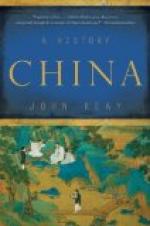All these struggles raged round the capital, for each of the princes wanted to secure full power and to become emperor. Thus the border regions remained relatively undisturbed. Their population suffered much less from the warfare than the unfortunate people in the neighbourhood of the central government. For this reason there took place a mass migration of Chinese from the centre of the empire to its periphery. This process, together with the shifting of the frontier peoples, is one of the most important events of that epoch. A great number of Chinese migrated especially into the present province of Kansu, where a governor who had originally been sent there to fight the Hsien-pi had created a sort of paradise by his good administration and maintenance of peace. The territory ruled by this Chinese, first as governor and then in increasing independence, was surrounded by Hsien-pi, Tibetans, and other peoples, but thanks to the great immigration of Chinese and to its situation on the main caravan route to Turkestan, it was able to hold its own, to expand, and to become prosperous.
Other groups of Chinese peasants migrated southward into the territories of the former state of Wu. A Chinese prince of the house of the Chin was ruling there, in the present Nanking. His purpose was to organize that territory, and then to intervene in the struggles of the other princes. We shall meet him again at the beginning of the Hun rule over North China in 317, as founder and emperor of the first south Chinese dynasty, which was at once involved in the usual internal and external struggles. For the moment, however, the southern region was relatively at peace, and was accordingly attracting settlers.
Finally, many Chinese migrated northward, into the territories of the frontier peoples, not only of the Hsien-pi but especially of the Huns. These alien peoples, although in the official Chinese view they were still barbarians, at least maintained peace in the territories they ruled, and they left in peace the peasants and craftsmen who came to them, even while their own armies were involved in fighting inside China. Not only peasants and craftsmen came to the north but more and more educated persons. Members of families of the gentry that had suffered from the fighting, people who had lost their influence in China, were welcomed by the Huns and appointed teachers and political advisers of the Hun nobility.
5 Victory of the Huns. The Hun Han dynasty (later renamed the Earlier Chao dynasty)
With its self-confidence thus increased, the Hun council of nobles declared that in future the Huns should no longer fight now for one and now for another Chinese general or prince. They had promised loyalty to the Chinese emperor, but not to any prince. No one doubted that the Chinese emperor was a complete nonentity and no longer played any part in the struggle for power. It was evident that the murders would continue until one of the generals or princes overcame the rest and made himself emperor. Why should not the Huns have the same right? Why should not they join in this struggle for the Chinese imperial throne?




